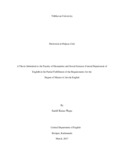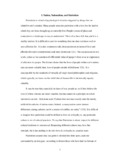Please use this identifier to cite or link to this item:
https://elibrary.tucl.edu.np/handle/123456789/3133| Title: | Patriotism in Palpasa Cafe |
| Authors: | Thapa, Sushil Kumar |
| Keywords: | Nationalism and Patriotism;Palpasa Cafe;Progress and Solidarity;Nepali Novel |
| Issue Date: | Mar-2017 |
| Publisher: | Faculty of Art in English |
| Abstract: | This research examines the novel Palapsa café by Patriotism theory which is a kind of psychological stimulus triggered by things that are related to one’s country. This novel is the story of a Kathmandu-based artist, Drishya, who falls in love with a Nepali American returnee, Palpasa. Along the way Drishya also sees for himself the devastating effects of Nepal’s conflict in the hills, via a mysterious old college friend now turned Maoist. These three characters who narrate the story in turns. Palpasa is pushed ahead by the intense sense of expressing love for her motherland. That is why she comes back to her motherland by discarding every available opportunity she gets in America. Unlike the romantic egoist driven by far-fetched ideas, they are committed to the real life. Characters like Drishya and Palpasa demonstrate endurance, vision, determination and intense will to overcome every hurdle that occurs in their lives. In their encounter with all the challenges and hurdles lies traces of heroism traits and attributes. These traits and attributes are examined excluding all the unrelated and unrelated details. The novel also, obviously, reflects the author’s own experience as a Brahmin male based largely in Kathmandu. I hope to show that Wagle’s journalism background rather than his caste identity is crucial in understanding Palpasa Café’s successes and failures. It is to Wagle’s credit that he has written about what he knows and not attempted to include many different aspects of Nepal which would, incidentally, be a very boring exercise in paint-by-numbers prescriptive fiction. Unfortunately Palpasa Café currently seems to be more discussed for a literary prize that it should or should not have won, as well as for its marketing process than for its actual content.One intention of translating the novel into English is surely to help foreigners, both tourist and expatriates alike, to understand what happened in the recent Nepali past. |
| URI: | http://elibrary.tucl.edu.np/handle/123456789/3133 |
| Appears in Collections: | English |
Files in This Item:
| File | Description | Size | Format | |
|---|---|---|---|---|
| cover.pdf | 333.35 kB | Adobe PDF |  View/Open | |
| chapter.pdf | 440.88 kB | Adobe PDF |  View/Open |
Items in DSpace are protected by copyright, with all rights reserved, unless otherwise indicated.
